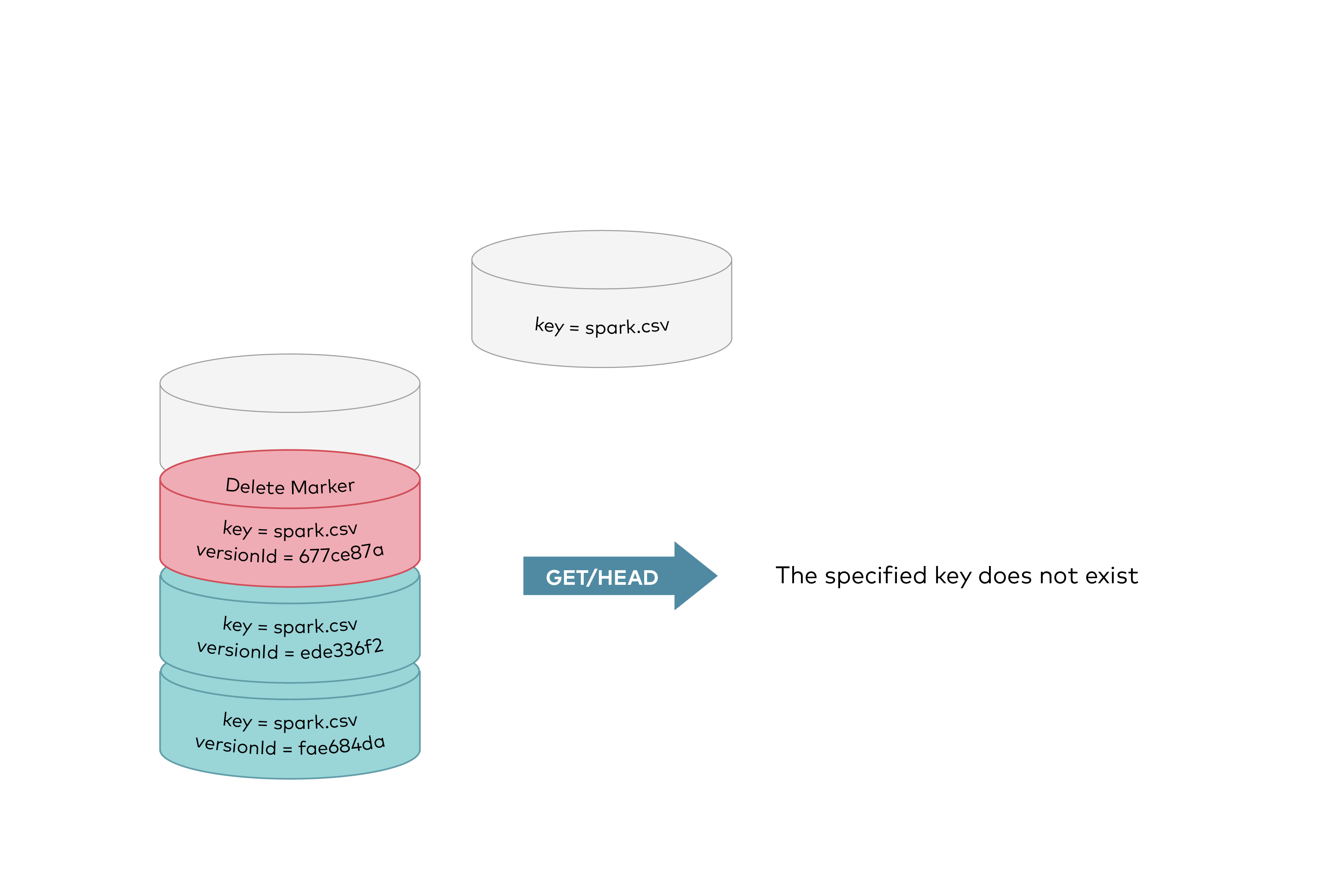- Sort Score
- Result 10 results
- Languages All
Results 341 - 350 of 935 for requestID (0.52 sec)
-
docs/bucket/replication/DESIGN.md
An additional header `X-Minio-Replication-Delete-Status` is returned which would show `PENDING` or `FAILED` status...
Registered: Sun Dec 28 19:28:13 UTC 2025 - Last Modified: Tue Aug 12 18:20:36 UTC 2025 - 14.7K bytes - Viewed (0) -
docs/bucket/versioning/README.md
Now the delete marker becomes the current version of the object. GET requests by default always retrieve the latest stored version. So performing a simple GET object request when the current version is a delete marker would return `404` `The specified key does not exist` as shown below: 
Registered: Sun Dec 28 19:28:13 UTC 2025 - Last Modified: Tue Aug 12 18:20:36 UTC 2025 - 12K bytes - Viewed (0) -
cmd/metrics-v2_test.go
labels := []string{"GetObject", "PutObject", "CopyObject", "CompleteMultipartUpload"} ttfbHist := prometheus.NewHistogramVec( prometheus.HistogramOpts{ Name: "s3_ttfb_seconds", Help: "Time taken by requests served by current MinIO server instance", Buckets: histBuckets, }, []string{"api"}, ) observations := []struct { val float64 label string }{ { val: 0.02, label: labels[0],Registered: Sun Dec 28 19:28:13 UTC 2025 - Last Modified: Sun Mar 30 00:56:02 UTC 2025 - 6.8K bytes - Viewed (0) -
docs/kms/README.md
# KMS Guide [](https://slack.min.io) MinIO uses a key-management-system (KMS) to support SSE-S3. If a client requests SSE-S3, or auto-encryption is enabled, the MinIO server encrypts each object with a unique object key which is protected by a master key managed by the KMS. ## Quick Start
Registered: Sun Dec 28 19:28:13 UTC 2025 - Last Modified: Tue Aug 12 18:20:36 UTC 2025 - 7.2K bytes - Viewed (0) -
src/main/java/jcifs/internal/smb2/rdma/disni/DisniRdmaConnection.java
public RdmaNegotiateResponse negotiate(RdmaNegotiateRequest request) throws IOException { // Simulate successful negotiation for skeleton implementation RdmaNegotiateResponse response = new RdmaNegotiateResponse(); response.setStatus(0); // Success response.setSelectedVersion(request.getMaxVersion()); response.setCreditsGranted(request.getCreditsRequested());
Registered: Sat Dec 20 13:44:44 UTC 2025 - Last Modified: Sat Aug 23 05:11:12 UTC 2025 - 10.2K bytes - Viewed (0) -
src/main/java/org/codelibs/fess/app/web/admin/reqheader/EditForm.java
import jakarta.validation.constraints.Size; /** * Form class for editing request header configurations in the admin interface. * This form extends CreateForm to include fields necessary for updating existing request header entries, * including tracking information for optimistic locking and audit trails. * Request headers are used to customize HTTP requests sent during web crawling operations. * */ public class EditForm extends CreateForm {Registered: Sat Dec 20 09:19:18 UTC 2025 - Last Modified: Thu Jul 17 08:28:31 UTC 2025 - 2.4K bytes - Viewed (0) -
docs/ru/docs/help-fastapi.md
* Задать **вопрос** или спросить о **проблеме**. * Предложить новую **возможность**. **Заметка**: если Вы это сделаете, то я попрошу Вас также помогать другим. 😉 ## Проверять пулл-реквесты { #review-pull-requests } Вы можете помочь мне проверять пулл-реквесты других участников. И, снова, постарайтесь быть доброжелательными. 🤗 --- О том, что нужно иметь в виду и как проверять пулл-реквест:Registered: Sun Dec 28 07:19:09 UTC 2025 - Last Modified: Tue Sep 30 11:24:39 UTC 2025 - 21.9K bytes - Viewed (0) -
src/test/java/jcifs/internal/smb2/ioctl/Smb2IoctlResponseTest.java
/* * Tests for Smb2IoctlResponse. * * Notes: * - Comments are in English as requested. * - JUnit 5 is used; Mockito is not required here. */ package jcifs.internal.smb2.ioctl; import static org.junit.jupiter.api.Assertions.assertArrayEquals; import static org.junit.jupiter.api.Assertions.assertEquals; import static org.junit.jupiter.api.Assertions.assertNotNull; import static org.junit.jupiter.api.Assertions.assertNull;
Registered: Sat Dec 20 13:44:44 UTC 2025 - Last Modified: Thu Aug 14 05:31:44 UTC 2025 - 10.9K bytes - Viewed (0) -
src/main/java/jcifs/smb/SmbEnumerationUtil.java
throw new SmbException(u.toString() + " directory must end with '/'"); } if (locator.getType() != SmbConstants.TYPE_SERVER) { throw new SmbException("The requested list operations is invalid: " + u.toString()); } final Set<FileEntry> set = new HashSet<>(); if (tc.getDfs().isTrustedDomain(tc, locator.getServer())) { /*
Registered: Sat Dec 20 13:44:44 UTC 2025 - Last Modified: Thu Aug 14 07:14:38 UTC 2025 - 12.3K bytes - Viewed (0) -
okhttp/src/commonJvmAndroid/kotlin/okhttp3/Call.kt
import okio.Timeout /** * A call is a request that has been prepared for execution. A call can be canceled. As this object * represents a single request/response pair (stream), it cannot be executed twice. */ interface Call : Cloneable { /** Returns the original request that initiated this call. */ fun request(): Request /**
Registered: Fri Dec 26 11:42:13 UTC 2025 - Last Modified: Wed Nov 05 18:28:35 UTC 2025 - 6.8K bytes - Viewed (0)